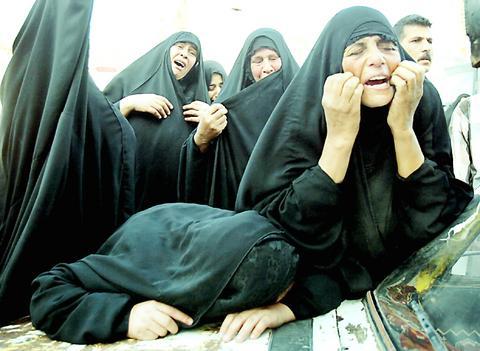Two US soldiers and more than a dozen Iraqi militiamen were killed in skirmishes overnight around the Shiite holy city of Najaf, the fourth day of clashes since militia leader Moqtada al-Sadr offered a truce.
Iraqi leaders sharply criticized US officials for blocking their choice of a president to succeed former president Saddam Hussein when the US occupation authority is wound up in a month's time.
The gulf between US and Iraqi preferences was so wide that US officials asked to postpone talks by a day until today.

PHOTO: REUTERS
With the top post of prime minister filled by Iyad Allawi on Friday and key ministerial jobs also broadly agreed on, deadlock set in when the US-appointed Governing Council rallied behind Ghazi Yawar for the largely ceremonial post of president against Adnan Pachachi, who is favored by Washington and the UN
Both are Sunni Muslim Council members. Yawar is a tribal chief and civil engineer from northern Iraq and enjoys support from Kurds and majority Shiites. Pachachi is an 81-year-old former foreign minister from a Baghdad political dynasty.
"There's quite a lot of interference. They should let the Iraqis decide for themselves. This is an Iraqi affair," said Mahmoud Othman, a Kurd on the 22-member Council.
Many Iraqis question whether the Council truly represents public opinion. Washington asked UN envoy Lakhdar Brahimi to consult broadly among Iraqis and nominate an interim government to oversee elections in the new year.
But the Governing Council caught Brahimi off-guard on Friday by announcing the choice of Allawi, a secular Shiite who worked with the CIA from exile to overthrow Saddam. It appears set on having its way again. US and UN officials were not available for comment and their objections to Yawar were not clear.
The current head of the council, he left Iraq in 1990 and ran a telecoms company in Saudi Arabia. He has criticized the US-drafted UN resolution that sets out the handover plan, complaining it gives Iraqis too little control of the 150,000 mainly American foreign soldiers remaining in the country.
The US military said two soldiers were killed by Shiite militia at Kufa, just outside Najaf, late on Sunday and that US troops killed close to 20 guerrillas in response.
A car blew up on a busy Baghdad street yesterday, killing two Iraqis and wounding 13. The cause of the blast was unclear.
A bomb blew up in a van as a Dutch patrol approached it in Samawa but there were no casualties, Dutch troops at the scene said. Japanese forces are also in the area.

Conflict with Taiwan could leave China with “massive economic disruption, catastrophic military losses, significant social unrest, and devastating sanctions,” a US think tank said in a report released on Monday. The German Marshall Fund released a report titled If China Attacks Taiwan: The Consequences for China of “Minor Conflict” and “Major War” Scenarios. The report details the “massive” economic, military, social and international costs to China in the event of a minor conflict or major war with Taiwan, estimating that the Chinese People’s Liberation Army (PLA) could sustain losses of more than half of its active-duty ground forces, including 100,000 troops. Understanding Chinese

The Ministry of Foreign Affairs (MOFA) yesterday said it is closely monitoring developments in Venezuela, and would continue to cooperate with democratic allies and work together for regional and global security, stability, and prosperity. The remarks came after the US on Saturday launched a series of airstrikes in Venezuela and kidnapped Venezuelan President Nicolas Maduro, who was later flown to New York along with his wife. The pair face US charges related to drug trafficking and alleged cooperation with gangs designated as terrorist organizations. Maduro has denied the allegations. The ministry said that it is closely monitoring the political and economic situation

‘SLICING METHOD’: In the event of a blockade, the China Coast Guard would intercept Taiwanese ships while its navy would seek to deter foreign intervention China’s military drills around Taiwan this week signaled potential strategies to cut the nation off from energy supplies and foreign military assistance, a US think tank report said. The Chinese People’s Liberation Army (PLA) conducted what it called “Justice Mission 2025” exercises from Monday to Tuesday in five maritime zones and airspace around Taiwan, calling them a warning to “Taiwanese independence” forces. In a report released on Wednesday, the Institute for the Study of War said the exercises effectively simulated blocking shipping routes to major port cities, including Kaohsiung, Keelung and Hualien. Taiwan would be highly vulnerable under such a blockade, because it

UNRELENTING: China attempted cyberattacks on Taiwan’s critical infrastructure 2.63 million times per day last year, up from 1.23 million in 2023, the NSB said China’s cyberarmy has long engaged in cyberattacks against Taiwan’s critical infrastructure, employing diverse and evolving tactics, the National Security Bureau (NSB) said yesterday, adding that cyberattacks on critical energy infrastructure last year increased 10-fold compared with the previous year. The NSB yesterday released a report titled Analysis on China’s Cyber Threats to Taiwan’s Critical Infrastructure in 2025, outlining the number of cyberattacks, major tactics and hacker groups. Taiwan’s national intelligence community identified a large number of cybersecurity incidents last year, the bureau said in a statement. China’s cyberarmy last year launched an average of 2.63 million intrusion attempts per day targeting Taiwan’s critical